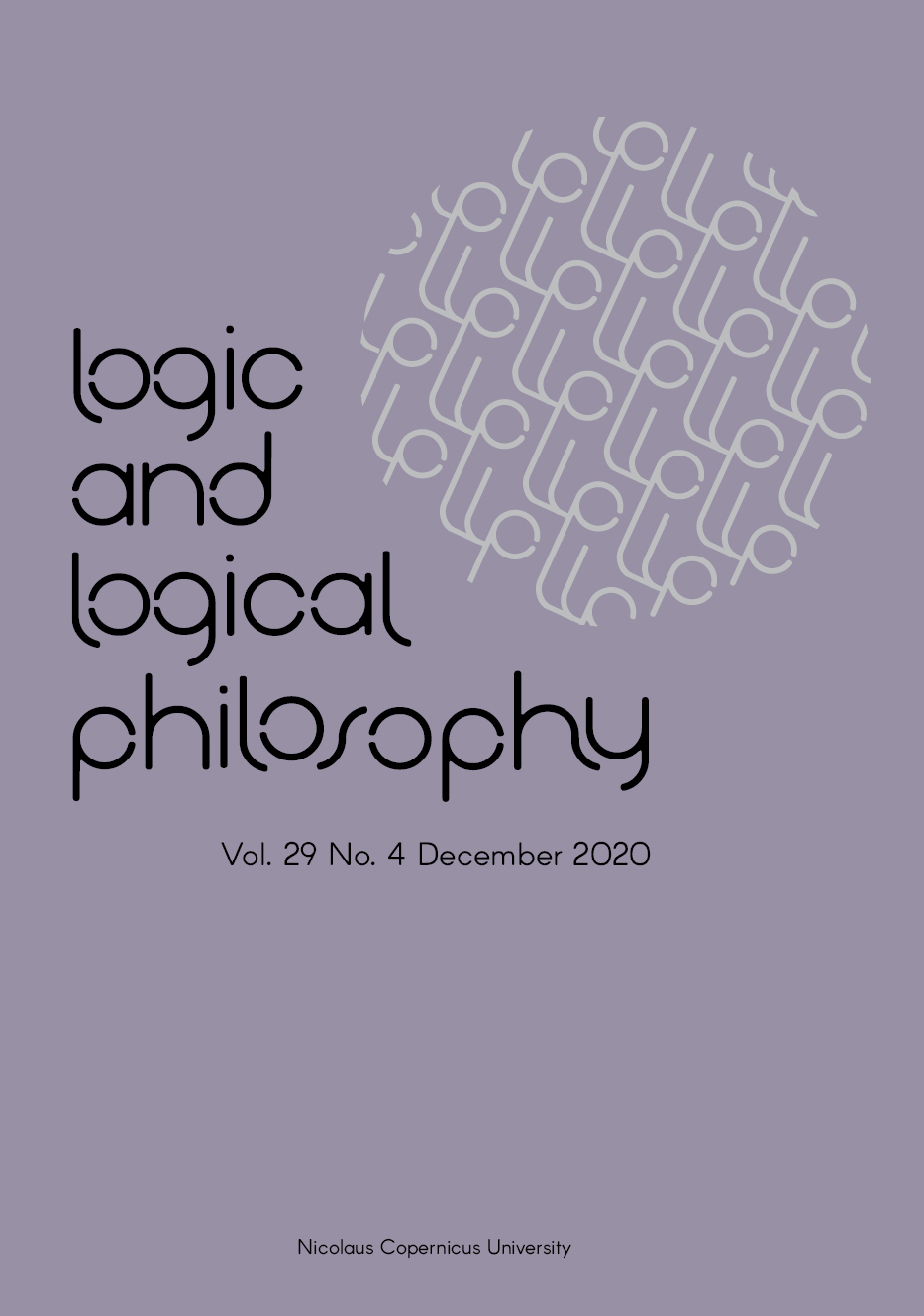Sorites, Curry and Suitable Models
DOI:
https://doi.org/10.12775/LLP.2020.006Keywords
paradoxes, vagueness, truth, ω-inconsistency, Łukasiewicz logicAbstract
In this paper we present two new approaches for dealing with semantic paradoxes and soritical predicates based on fuzzy logic. We show that both of them have conceptual advantages over the more traditional Łukasiewicz approach, and that the second one even avoids standard proofs of ω-nconsistency.
References
Bacon, A., “Curry’s paradox and ω-inconsistency”, Studia Logica 101, 1 (2013): 1–9. DOI: https://doi.org/10.1007/s11225-012-9373-3
Barrio, E., “Theories of truth without standard models and Yablo’s sequences”, Studia Logica 96, 3 (2010): 375–391. DOI: http://dx.doi.org/10.1007/s11225-010-9289-8
Barrio, E., and L. Picollo, “Notes on ω-inconsistent theories of truth in second-order languages”, The Review of Symbolic Logic 6, 4 (2013): 733–741. DOI: http://dx.doi.org/10.1017/S1755020313000269
Barrio, E., and B. Da Ré, “Truth without standard models: Some conceptual problems reloaded”, Journal of Applied Non-Classical Logics 28, 1 (2018): 122–139. DOI: http://dx.doi.org/10.1080/11663081.2017.1397326
Cobreros, P., P. Egré, D. Ripley and R. van Rooij, “Vagueness, truth and permissive consequence”, pages 1–24 in T. Achourioti et. al. (eds.), Unifying the Philosophy of Truth, Springer, 2014. DOI: http://dx.doi.org/10.1007/978-94-017-9673-6_21
Cook, R., “What is a truth value and how many are there?”, Studia Logica 92, 2 (2009): 183. DOI: http://dx.doi.org/10.1007/s11225-009-9194-1
Cornelis, C., G. Deschrijver and E. Kerre, “Advances and challenges in interval-valued fuzzy logic”, Fuzzy Sets and Systems 157, 5 (2006): 622–627. DOI: http://dx.doi.org/10.1016/j.fss.2005.10.007
Edgington, D., “Vagueness by degrees”, pages 294–316 in R. Keefe and P. Smith (eds.), Vagueness by Degrees, MIT Press, 1997.
Field, H., Saving Truth from Paradox, Oxford University Press, New York, 2008. DOI: http://dx.doi.org/10.1093/acprof:oso/9780199230747.001.0001
Goguen, J., “The logic of inexact concepts”, Synthese 19, 3–4 (1969): 25–373. DOI: http://dx.doi.org/10.1007/BF00485654
Gupta, A., “In praise of a logic of definitions that tolerates ω-inconsistency”, Philosophical Issues 28, 1 (2018): 176–195.
Hájek, P., Metamathematics of Fuzzy Logic, Trends in Logic, volume 4, Springer Science & Business Media, 2013. DOI: http://dx.doi.org/10.1007/978-94-011-5300-3
Hájek, P., J. Paris and J. Shepherdson, “The liar paradox and fuzzy logic”, The Journal of Symbolic Logic 65, 1 (2000): 339–346. DOI: http://dx.doi.org/10.2307/2586541
Halbach, V., Axiomatic Theories of Truth, Cambridge University Press, 2011. DOI: http://dx.doi.org/10.1017/CBO9780511921049
Keefe, R., Theories of Vagueness, Cambridge University Press, 2000.
Kripke, S., “Outline of a theory of truth”, Journal of Philosophy 72, 19 (1975): 690–716. DOI: http://dx.doi.org/10.2307/2024634
Pailos, F., and L. Rosenblatt, “Non-deterministic conditionals and transparent truth”, Studia Logica 103, 3 (2015): 579–598. DOI: http://dx.doi.org/10.1007/s11225-014-9580-1
Priest, G., “The logic of paradox”, Journal of Philosophical Logic 8, 1 (1979): 219–241. DOI: http://dx.doi.org/10.1007/BF00258428
Priest, G., Beyond the Limits of Thought, Oxford University Press, 2002. DOI: http://dx.doi.org/10.1093/acprof:oso/9780199254057.001.0001
Priest, G., “What if? the exploration of an idea”, The Australasian Journal of Logic 14, 1 (2017). DOI: http://dx.doi.org/10.26686/ajl.v14i1.4028
Priest, G., et al., “Inclosures, vagueness, and self-reference”, Notre Dame Journal of Formal Logic 51, 1 (2010): 69–84. DOI: http://dx.doi.org/10.1215/00294527-2010-005
Restall, G., “Arithmetic and truth in Łukasiewicz logic”, Logique et Analyse 140 (1992): 303–312.
Restall, G., “On logics without contraction”, PhD Thesis, University of Queensland, 1993.
Wright, C., “On the coherence of vague predicates”, Synthese 30, 3 (1975): 325–365. DOI: http://dx.doi.org/10.1007/BF00485049
Yatabe, S., “Yablo-like paradoxes and co-induction”, pages 90–103 in New Frontiers in Artificial Intelligence, Springer, 2011. DOI: http://dx.doi.org/10.1007/978-3-642-25655-4_8
Downloads
Published
How to Cite
Issue
Section
Stats
Number of views and downloads: 484
Number of citations: 0







